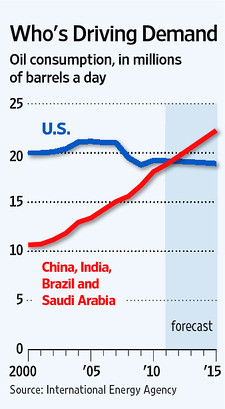Oil company profits will no doubt be higher this year. The Wall Street Journal chart below illustrates just who is driving demand; U.S. demand has flattened out, even decreased in the last year, most likely due to the recessionA recession is a significant and sustained decline in the economy. Typically, a recession lasts longer than six months, but recovery from a recession can take a few years. . The emerging economies of Brazil, India, China and Saudi Arabia, however, are projected to see steady demand in oil consumption through 2015.

As U.S. oil and gas companies attempt to keep up with demand in other parts of the world, they are also seeing their profits taxed heavily both inside and outside the United States. Between the years 1981 – 2008 U.S. oil companies paid roughly $700 billion in taxes to foreign governments.
Recent evidence from the Energy Information Agency (EIA) shows that government entities in the U.S. are also hugely dependent upon the direct and indirect taxes paid by the largest oil companies. Net earnings for the largest petroleum companies from 1981-2008 totaled $1.4 trillion and the total amount of taxes collected by U.S. governments from the oil companies in that same time period topped $1.95 trillion, roughly 40% more than the industry’s combined profits.
Finally, don’t forget that the burden of taxes on corporations must fall in some combination on consumers, owners (that is, shareholders), or employees. If lawmakers choose to raise taxes on the oil industry without lowering taxA tax is a mandatory payment or charge collected by local, state, and national governments from individuals or businesses to cover the costs of general government services, goods, and activities. rates—which seems to be the plan—consumers could pay higher prices, shareholders could receive lower dividends, or workers could get lower wages. None of these are good for the economy and somewhere a person will bear the burden of that net tax increase.
Share this article